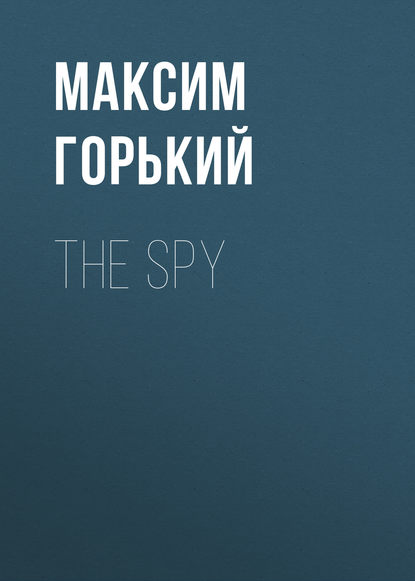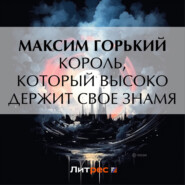По всем вопросам обращайтесь на: info@litportal.ru
(©) 2003-2024.
✖
The Spy
Настройки чтения
Размер шрифта
Высота строк
Поля
"He went back there," thought Klimkov, walking slowly along the pavement. "He will tell. Masha will curse me." He spat out, then hummed:
"Oh, garden, garden mine!" He stopped at a lamp-post, feeling he had to calm himself.
"Here I am, and I can sing if I want to. If a policeman hears it and asks, 'What are you bawling there?' I'll show him my ticket from the Department of Safety. 'Oh, excuse me!' he'll say. But if the joiner should sing, he'll be hustled off to the station-house, and they'll give him a cudgelling. 'Don't disturb the peace!'" Klimkov smiled, and peered into the darkness. "Well, brother, won't you strike up a song?"
However this failed to calm him as he had expected. His heart was sad, and a bitter soapy saliva seemed to be glued in his mouth, making tears well up in his eyes.
"O Ga-a-a-arden, ga-a-a-arden mine!
Green is this garden of mine."
He sang with the full power of his lungs, shutting his eyes tight. This did not help either. The dry, prickly tears trickled through his lids, and chilled his cheeks.
"Ky-a-b!" Klimkov called in a low voice, still trying to put on a bold front. But when he had seated himself in the sleigh, his body grew faint, as if a great many tightly drawn fibres had suddenly burst within him. His head drooped, and swaying from side to side in his seat he mumbled:
"A fine insult – very strong – thank you! Oh, you good people, wise people – "
This complaining was pleasant. It filled his heart with drunken sweetness. Yevsey had often felt this sweetness in his childhood. It set him in a martyr-like attitude toward people, and made him more significant to himself.
CHAPTER XIX
In the morning Yevsey lay in bed frowning up at the ceiling.
"Put my foot into it!" he thought dismally, as the recollection of what had happened the day before came back to him. "No, I oughtn't to track people, but track myself." The idea seemed strange to him. "How's that, though? Am I rascally toward myself?"
He remembered the melancholy hazel eyes of the joiner, the expression of dignity on his thin face, and his assured voice as he said, "It's chilly." Suddenly Yevsey was perplexed to feel within himself something alien, something ready to struggle with him. He rose to his feet, took in as much air as he could, and for a long time stood without emitting breath, as if to stifle inside himself that which was alien and which hindered him.
"I must stop all this. What do I want it for?" he urged himself. Nevertheless ease did not return. He began to dress lazily, compelling himself to think about the task of the day.
Now he seldom went about with goods, because there was much other work to be done. This day, for instance, he was to go to a factory suburb to observe the workingmen, with the object of discovering the persons who distributed proclamations.
He smeared his hands with soot and oil, then washed them with soap, after which an oily film was left, such as on the hands of metal workers. This was not essential. But Klimkov liked to dye his tufty hair, and color his brows and mustache. Such proceedings made his work more interesting, and heightened its gravity.
The handsome Grokhotov had been very assiduous in teaching Yevsey the art of disguising his face and figure. Grokhotov was sincerely attracted by the work. He possessed a large supply of beards, mustaches, and wigs of all colors, and could paste scars and warts on the face. Sometimes he would display his mimic arts to his comrades. Suddenly, right in everybody's presence, he would give his face, voice, and figure a striking resemblance to one of the officials. Or he would cackle like a goose, roar like a lion, bark like a dog, or meow like a cat. His astonished audience praised him generously, and held their sides with laughter, while he, smiling sedately, declared modestly:
"Just the A B C's. Wait until I've been at it a year. Then I'll go on the stage. I'll hit off all the celebrities, and I'll imitate every animal on earth."
Melnikov would look at him with contempt, and spit out. Once he even shouted:
"Hey, you clown, show us a louse."
"The louse is a mute insect," remarked the spy.
"Well, then, profit by its example. Eat and keep quiet."
While dressing Klimkov remembered this interchange of words, which in turn recalled Anatol.
"There," he thought, "Anatol would have made a good spy. But Zimin wouldn't do at all. His eyes are in the way. You can recognize him by the eyes at once. He certainly wants to take Masha as his mistress."
Yevsey stopped at the door, his heart unpleasantly gripped by this conjecture. But the next instant he waved his hand carelessly.
"To the devil with all of them! What do I care?"
This thought, which had calmed him before, now irritated a sore spot in his feelings.
The sun was shining, water flowed from the roofs babbling and washing away the dirty reddish snow. The people walked quickly and merrily. The good chimes of the Lenten bells floated lengthily in the warm moist atmosphere, mingling in a broad ribbon of soft sounds, which waved in the air, and floated from the city into the pale bluish distance.
"Now to go off somewhere, to walk in the fields, in the deserts," thought Yevsey, as he entered the narrow streets of the factory suburb.
Round about him rose the red filthy walls, supporting themselves one against the other. The sky over them was besmirched with smoke, the air was steeped in the stifling odor of warm oil. White teeth gleamed angrily in the dirty faces of the workingmen. All the surroundings were unlovely, and the eyes quickly wearied in looking upon the smoked stone cages in which the men worked.
At noon Klimkov, exhausted and feeling insulted by everything he saw, entered a tavern, where he ordered dinner to be brought to him at a small table next to a window. He reluctantly listened to the people's conversation. There were not many, but all were workingmen, who lazily cast short words at one another as they ate and drank. The only lively sound was of a young incessant voice which reached him from a corner.
"No, think, where does wealth come from?"
The person who spoke was a broad-shouldered, curly-haired fellow. Yevsey looked at him in vexation, and turned away. He frequently heard talks about wealth, which always inspired him with a sense of bored perplexity. He felt they were dictated only by envy and greed. He knew that just such talks were accounted noxious, and he forcibly compelled himself to listen to them, though to-day he wanted to traverse the broad light streets of the city.
"You work cheaply, and you buy dearly. Isn't it so?" cried the curly-headed fellow. "All wealth is accumulated from the money by which we are underpaid for our work. Let's take an example."
"Everybody's greedy," thought Yevsey. "How Masha snatched the beads yesterday! All are scoundrels. And the reason Zimin did not strike me was because he was afraid I would call the police. Ha! They drove me out, but they kept my presents. If they thought me a dirty fellow, they should have returned my presents, the skunks!"
Filling himself with the pleasant bitterness that comes from censuring people, he was carried away by it, and no longer heard or saw anything. Suddenly, however, a merry voice fell upon his ear.
"What, Yevsey Klimkov?"
He raised his head hastily, and wanted to rise, but was unable to do so. He saw standing before him the curly-headed orator, whom, however, he did not recognize.
"You don't know me? Yakov, your cousin."
He laughed, held out his hand to Yevsey, and seated himself opposite him at the table. His laughter enveloped Klimkov in a warm cloud of reminiscences – of the church, the quiet ravine, the fire, and the talks of the blacksmith. Silent, smiling in embarrassment, he carefully pressed his cousin's hand.
"I didn't recognize you."
"Of course!" exclaimed Yakov. "Your memory gets weak in the city. Various things creep upon you from all sides, so no place is left for the old. How are you getting along?"
"So, so."
"Out of work?"
"Yes."
Klimkov answered unwillingly. He wanted to know whereby this meeting might be dangerous for him. But Yakov spoke for both. He rapidly gave an account of the village, as if it were absolutely necessary for him to get through with it as quickly as possible. In two minutes he had told Yevsey that his father had gotten blind, that his mother was always sick, and that he had been living in the city three years working in the factory.
"There, you've got the whole story."
Yakov was even more thickly besmudged with soot and oil than most of the men. Though his clothes were torn he seemed to be rich. He was outspoken and free in his demeanor. Klimkov looked at him with pleasure, and recalled without malice how this strong fellow had beaten him.
"Is he a revolutionist, too?" he asked himself timidly.
"Well, how are you getting along?" said Yakov. His broad round face, glossy and smiling good-naturedly, called for frankness in return, which Klimkov, however, did not want to give. He felt the new and alien thing that he had found in his soul in the morning growing in him. In the desire to evade Yakov's questions, he himself began to interrogate.
"Oh, garden, garden mine!" He stopped at a lamp-post, feeling he had to calm himself.
"Here I am, and I can sing if I want to. If a policeman hears it and asks, 'What are you bawling there?' I'll show him my ticket from the Department of Safety. 'Oh, excuse me!' he'll say. But if the joiner should sing, he'll be hustled off to the station-house, and they'll give him a cudgelling. 'Don't disturb the peace!'" Klimkov smiled, and peered into the darkness. "Well, brother, won't you strike up a song?"
However this failed to calm him as he had expected. His heart was sad, and a bitter soapy saliva seemed to be glued in his mouth, making tears well up in his eyes.
"O Ga-a-a-arden, ga-a-a-arden mine!
Green is this garden of mine."
He sang with the full power of his lungs, shutting his eyes tight. This did not help either. The dry, prickly tears trickled through his lids, and chilled his cheeks.
"Ky-a-b!" Klimkov called in a low voice, still trying to put on a bold front. But when he had seated himself in the sleigh, his body grew faint, as if a great many tightly drawn fibres had suddenly burst within him. His head drooped, and swaying from side to side in his seat he mumbled:
"A fine insult – very strong – thank you! Oh, you good people, wise people – "
This complaining was pleasant. It filled his heart with drunken sweetness. Yevsey had often felt this sweetness in his childhood. It set him in a martyr-like attitude toward people, and made him more significant to himself.
CHAPTER XIX
In the morning Yevsey lay in bed frowning up at the ceiling.
"Put my foot into it!" he thought dismally, as the recollection of what had happened the day before came back to him. "No, I oughtn't to track people, but track myself." The idea seemed strange to him. "How's that, though? Am I rascally toward myself?"
He remembered the melancholy hazel eyes of the joiner, the expression of dignity on his thin face, and his assured voice as he said, "It's chilly." Suddenly Yevsey was perplexed to feel within himself something alien, something ready to struggle with him. He rose to his feet, took in as much air as he could, and for a long time stood without emitting breath, as if to stifle inside himself that which was alien and which hindered him.
"I must stop all this. What do I want it for?" he urged himself. Nevertheless ease did not return. He began to dress lazily, compelling himself to think about the task of the day.
Now he seldom went about with goods, because there was much other work to be done. This day, for instance, he was to go to a factory suburb to observe the workingmen, with the object of discovering the persons who distributed proclamations.
He smeared his hands with soot and oil, then washed them with soap, after which an oily film was left, such as on the hands of metal workers. This was not essential. But Klimkov liked to dye his tufty hair, and color his brows and mustache. Such proceedings made his work more interesting, and heightened its gravity.
The handsome Grokhotov had been very assiduous in teaching Yevsey the art of disguising his face and figure. Grokhotov was sincerely attracted by the work. He possessed a large supply of beards, mustaches, and wigs of all colors, and could paste scars and warts on the face. Sometimes he would display his mimic arts to his comrades. Suddenly, right in everybody's presence, he would give his face, voice, and figure a striking resemblance to one of the officials. Or he would cackle like a goose, roar like a lion, bark like a dog, or meow like a cat. His astonished audience praised him generously, and held their sides with laughter, while he, smiling sedately, declared modestly:
"Just the A B C's. Wait until I've been at it a year. Then I'll go on the stage. I'll hit off all the celebrities, and I'll imitate every animal on earth."
Melnikov would look at him with contempt, and spit out. Once he even shouted:
"Hey, you clown, show us a louse."
"The louse is a mute insect," remarked the spy.
"Well, then, profit by its example. Eat and keep quiet."
While dressing Klimkov remembered this interchange of words, which in turn recalled Anatol.
"There," he thought, "Anatol would have made a good spy. But Zimin wouldn't do at all. His eyes are in the way. You can recognize him by the eyes at once. He certainly wants to take Masha as his mistress."
Yevsey stopped at the door, his heart unpleasantly gripped by this conjecture. But the next instant he waved his hand carelessly.
"To the devil with all of them! What do I care?"
This thought, which had calmed him before, now irritated a sore spot in his feelings.
The sun was shining, water flowed from the roofs babbling and washing away the dirty reddish snow. The people walked quickly and merrily. The good chimes of the Lenten bells floated lengthily in the warm moist atmosphere, mingling in a broad ribbon of soft sounds, which waved in the air, and floated from the city into the pale bluish distance.
"Now to go off somewhere, to walk in the fields, in the deserts," thought Yevsey, as he entered the narrow streets of the factory suburb.
Round about him rose the red filthy walls, supporting themselves one against the other. The sky over them was besmirched with smoke, the air was steeped in the stifling odor of warm oil. White teeth gleamed angrily in the dirty faces of the workingmen. All the surroundings were unlovely, and the eyes quickly wearied in looking upon the smoked stone cages in which the men worked.
At noon Klimkov, exhausted and feeling insulted by everything he saw, entered a tavern, where he ordered dinner to be brought to him at a small table next to a window. He reluctantly listened to the people's conversation. There were not many, but all were workingmen, who lazily cast short words at one another as they ate and drank. The only lively sound was of a young incessant voice which reached him from a corner.
"No, think, where does wealth come from?"
The person who spoke was a broad-shouldered, curly-haired fellow. Yevsey looked at him in vexation, and turned away. He frequently heard talks about wealth, which always inspired him with a sense of bored perplexity. He felt they were dictated only by envy and greed. He knew that just such talks were accounted noxious, and he forcibly compelled himself to listen to them, though to-day he wanted to traverse the broad light streets of the city.
"You work cheaply, and you buy dearly. Isn't it so?" cried the curly-headed fellow. "All wealth is accumulated from the money by which we are underpaid for our work. Let's take an example."
"Everybody's greedy," thought Yevsey. "How Masha snatched the beads yesterday! All are scoundrels. And the reason Zimin did not strike me was because he was afraid I would call the police. Ha! They drove me out, but they kept my presents. If they thought me a dirty fellow, they should have returned my presents, the skunks!"
Filling himself with the pleasant bitterness that comes from censuring people, he was carried away by it, and no longer heard or saw anything. Suddenly, however, a merry voice fell upon his ear.
"What, Yevsey Klimkov?"
He raised his head hastily, and wanted to rise, but was unable to do so. He saw standing before him the curly-headed orator, whom, however, he did not recognize.
"You don't know me? Yakov, your cousin."
He laughed, held out his hand to Yevsey, and seated himself opposite him at the table. His laughter enveloped Klimkov in a warm cloud of reminiscences – of the church, the quiet ravine, the fire, and the talks of the blacksmith. Silent, smiling in embarrassment, he carefully pressed his cousin's hand.
"I didn't recognize you."
"Of course!" exclaimed Yakov. "Your memory gets weak in the city. Various things creep upon you from all sides, so no place is left for the old. How are you getting along?"
"So, so."
"Out of work?"
"Yes."
Klimkov answered unwillingly. He wanted to know whereby this meeting might be dangerous for him. But Yakov spoke for both. He rapidly gave an account of the village, as if it were absolutely necessary for him to get through with it as quickly as possible. In two minutes he had told Yevsey that his father had gotten blind, that his mother was always sick, and that he had been living in the city three years working in the factory.
"There, you've got the whole story."
Yakov was even more thickly besmudged with soot and oil than most of the men. Though his clothes were torn he seemed to be rich. He was outspoken and free in his demeanor. Klimkov looked at him with pleasure, and recalled without malice how this strong fellow had beaten him.
"Is he a revolutionist, too?" he asked himself timidly.
"Well, how are you getting along?" said Yakov. His broad round face, glossy and smiling good-naturedly, called for frankness in return, which Klimkov, however, did not want to give. He felt the new and alien thing that he had found in his soul in the morning growing in him. In the desire to evade Yakov's questions, he himself began to interrogate.

















